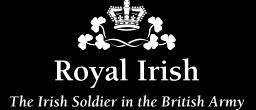Kenya, a Colonial War

|
| Weapon testing! |
The 1st Battalion The Royal Inniskilling Fusiliers served twice in Kenya; from 1953-1955 and 1960-1963. During the former period, the Battalion was flown to the colony at short notice during the Mau Mau uprising.
Mau Mau, drawn mainly from the Kikuyu tribe, concentrated on raiding European farms, destroying crops and animals, and killing or intimidating both white and black Kenyans. The Battalion alternated between Nairobi, operating roadblocks, cordon and search operations and in the area northeast of Mount Kenya where patrols, sweeps and ambushes were carried out. In 1955, the Regiment was awarded the Freedom of the City of Nairobi, a unique honour as no other British regiment has ever been awarded the Freedom of a colonial city.
The second period of service in Kenya was markedly different from the first in that it was a planned 'Arms Plot move' to join 24 Brigade as part of the Strategic Reserve. The Battalion travelled out by troopship on HMT Devonshire, although A and B Companies were detached for a year in Bahrain.
In 1961 Iraq attempted to invade Kuwait on the expiry of a British-Kuwaiti defence agreement. At very short notice, the Battalion was flown to Kuwait on Operation VANTAGE along with the 2nd Battalion The Coldstream Guards and the 1st Battalion The Kings Regiment. They occupied a defensive position on the Mutla Ridge from where they were able to dominate ground to the north and west of Kuwait City up to the Iraq Border. Three months were spent in Kuwait during the hottest part of the year before staging through Bahrain for a further three weeks before returning to Kenya where the new barracks at Kahawa was occupied for the first time.
Preparation then began in earnest for the presentation of new Colours by the Colonel-in-Chief in February 1962. Prior to leaving Kenya, the battalion was able to exercise the Freedom of Nairobi by marching through the city with 'Colours flying, bayonets fixed and bands playing" on two occassions, firstly in 1960 and again in 1962. On the latter occasion, the first African-Kenyan mayor of Nairobi, Charles Wanyoike Rubia, took the salute.











